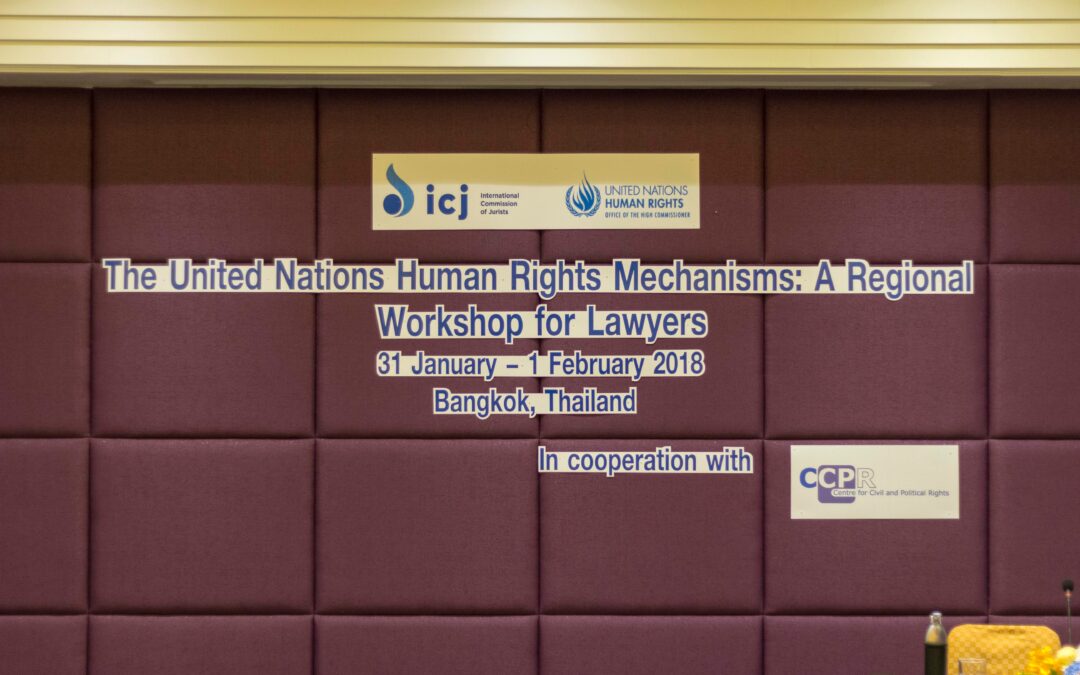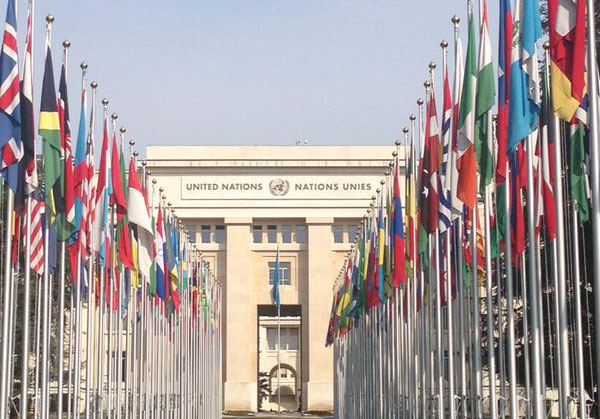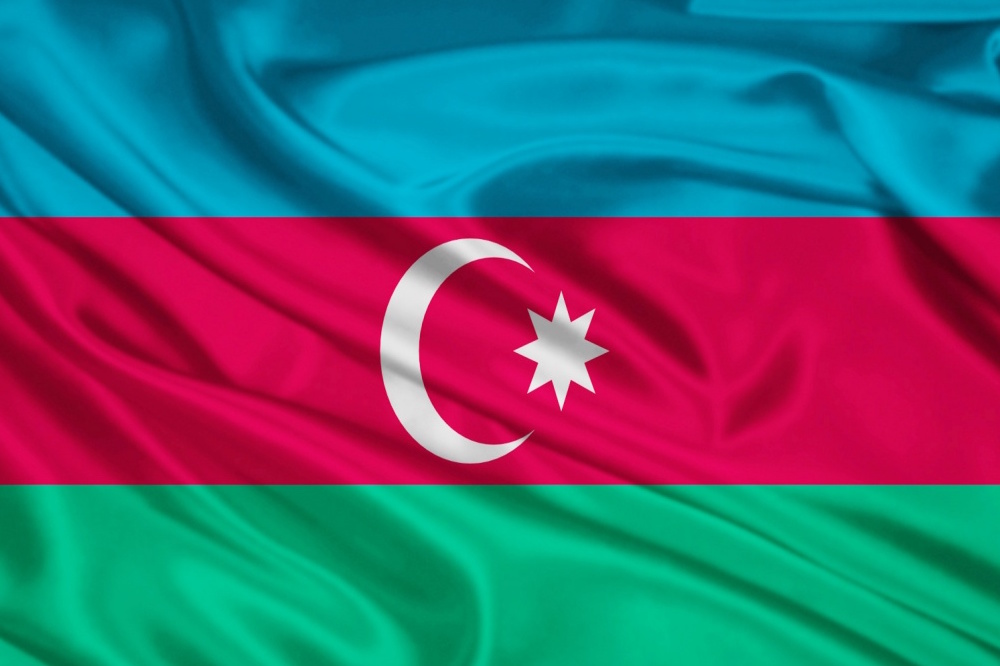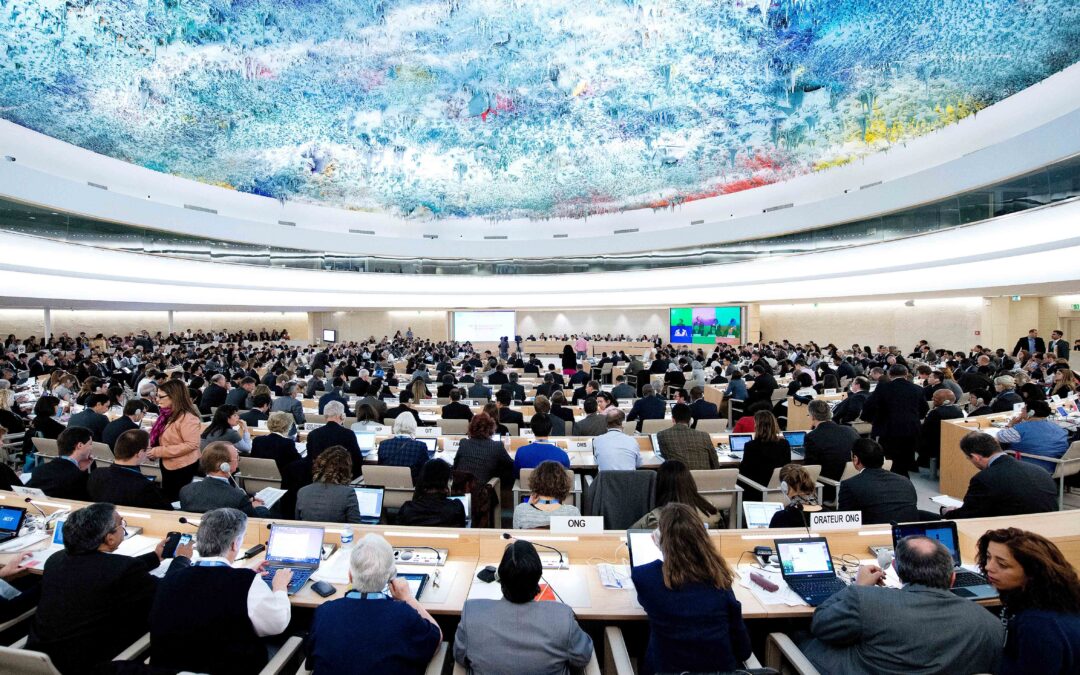
Feb 27, 2018 | Events, News
The ICJ, in collaboration with the UN High Commissioner for Human Rights Regional Office for South-East Asia (OHCHR), and the Centre for Civil and Political Rights, organised a workshop for lawyers from southeast Asia, on engaging with UN human rights mechanisms.
The two-day workshop provided some thirty lawyers from Thailand, Cambodia, Vietnam, and Lao PDR with knowledge, practical skills and expert advice about UN human rights mechanisms, with the participants themselves sharing their own experiences and expertise.
In addition to explaining what the UN mechanisms are and how they work, the workshop discussed how lawyers can use the outputs of UN human rights mechanisms in their professional activities, as well as how to communicate with and participate in UN human rights mechanisms in order to ensure good cooperation and to best serve the interests of their clients.
Sessions were introduced by presentations by the ICJ’s Main Representative to the United Nations in Geneva and OHCHR officials, followed by discussions and practical exercises in which all participants were encouraged to contribute questions and their own observations.
A special discussion of effective engagement of lawyers with Treaty Bodies was led by Professor Yuval Shany, a member of the Human Rights Committee established to interpret and apply the International Covenant on Civil and Political Rights (ICCPR).
The workshop also aimed to encourage the building of relationships and networks between the lawyers from across the region.
The workshop forms part of a broader project of awareness-raising and capacity-building for lawyers from the region, about UN mechanisms.
A similar workshop was held in January 2017 for lawyers from Myanmar.
The project has also published (unofficial) translations of key UN publications into relevant languages, and is hosting lawyers in a mentorship programme in Geneva.
More details are available by contacting UN Representative Matt Pollard (matt.pollard(a)icj.org) or by clicking here: https://www.icj.org/accesstojusticeunmechanisms/

Feb 20, 2018
The ICJ and seven other human rights organizations have written to the UN Secretary General, António Guterres, about the appointment of the High Commissioner for Human Rights.
Dear Secretary-General, as you begin to search for the next High Commissioner for Human Rights, we emphasize the high expectations that our organizations have for the successor to this office. Appointing a capable, strong and qualified High Commissioner is crucial at this time when fundamental principles of human rights are being challenged, and the integrity and independence of the United Nations human rights system is under attack. We urge you to vigorously defend the High Commissioner’s Office’s ability to operate without interference, and select a new High Commissioner capable of ensuring its independence.
Criteria/Qualifications for appointment
Our organizations consider that the next High Commissioner needs to be someone of the highest international standing and integrity, with a proven record of bold and principled public advocacy for human rights. She or he should be a human rights champion ready to be independent and outspoken in fulfilling the High Commissioner’s mandate. The High Commissioner should be a strong leader with a clear vision for the promotion and protection of all human rights, and bring energy, courage and commitment to the position. The High Commissioner should especially highlight human rights issues that have fallen beneath the radar, and be ready to hold States accountable without fear of repercussions. She or he should be able to inspire those working for the promotion and protection of human rights and the broader international community, and be able to navigate effectively within a complex human rights community that comprises governments, civil society and other stakeholders. Most importantly, the High Commissioner should be accessible to victims and others directly affected by human rights violations. We urge you to select an exceptionally qualified candidate capable of meeting the demands of this important post from the outset.
Selection process
The process that led to your own appointment as United Nations Secretary-General was the most transparent to date, and we believe a similar approach should be used to identify and appoint the High Commissioner for Human Rights. A robust and transparent selection process is key to ensuring the credibility of the appointment, and to identifying the most qualified candidate for the job. Transparency, accountability and professionalism are important values in the United Nations, and we urge you to strictly apply these principles to the selection of the next High Commissioner.
We recommend that a formal person specification be formulated and made public. We consider such a specification would assist in the identification of candidates and the assessment of their competencies. The selection process should include wide consultation with all stakeholders, including civil society. We consider it would be beneficial for there to be a set timetable for nominations, shortlisting and final selection to facilitate participation by all stakeholders in the selection process and ensure transparency.
Human rights are one of the pillars of the United Nations. It is vital that the next holder of this position be a compelling leader for human rights within the United Nations system and throughout the world. In the year of the 70th anniversary of the Universal Declaration of Human Rights, we urge you to put in place a process that reflects the seriousness and significance of this appointment to human rights victims and defenders worldwide.
Yours sincerely,
Amnesty International
Asian Forum for Human Rights and Development (FORUM-ASIA)
Cairo Institute for Human Rights Studies
CIVICUS
Human Rights Watch
International Commission of Jurists
International Federation for Human Rights (FIDH)
International Service for Human Rights

Jan 31, 2018 | Advocacy, Non-legal submissions
The ICJ submitted a written statement on impunity and transitional justice, ahead of the March 2018 session of the UN Human Rights Council.
The written statement can be downloaded in PDF format below:
In English: UN-HRC37-WrittenStatement-NepalPeruImpunity-EN
In Spanish: UN-HRC37-WrittenStatement-NepalPeruImpunity-ESP

Jan 30, 2018
Today, the ICJ filed its submission to the UN Committee against Torture on the compliance by Azerbaijan with its obligations under the UN Convention against Torture.
The Committee will consider it during the adoption of a list of issues prior to reporting (LOIPR) for the examination of the Fifth Periodic Report of Azerbaijan under Article 19 of the Convention against Torture and Other Cruel, Inhuman or Degrading Treatment or Punishment (CAT).
During its 63rd session, from 23 April to 18 May 2018, the Committee will prepare and adopt a LOIPR on Azerbaijan.
Once adopted, the LOIPR will be transmitted to the State party. Azerbaijan’s formal response to the LOIPR will then constitute its Fifth Periodic Report under article 19 of the Convention.
Azerbaijan ratified the CAT in 1996. The last Concluding Observations on the compliance by Azerbaijan with its obligations under the Convention were adopted in 2015.
The ICJ submission to the Committee highlights a number of ongoing concerns with respect to the country’s implementation of and compliance with the provisions of the CAT:
- Azerbaijan’s legislation governing the legal profession;
- the situation of lawyers in practice;
- the lack independence of the legal profession;
- the role of the Bar Association with regard to attacks on lawyers.
The observations made in this submissions are based on the ICJ’s report “Defenceless defenders: Systemic problems in the legal profession of Azerbaijan”, published in September 2016 following a research mission to the country. The report analyses Azerbaijan’s legislation governing the legal profession; the situation of lawyers in practice, in particular, in relation to the lack independence of the legal profession; as well as the role that the Bar Association plays in attacks on lawyers.
ICJ-AzerbaijanCAT-ListofIssues-Jan18-final (download the submission)

Dec 5, 2017 | Advocacy, Non-legal submissions
The ICJ today addressed an emergency Special Session of the UN Human Rights Council on Myanmar, outlining key requirements for the protection of the Rohingya minority, including safe and voluntary return of refugees.The Special Session is expected to adopt a resolution to address “The human rights situation of the minority Rohingya Muslim population and other minorities in the Rakhine State of Myanmar.”
The ICJ statement read as follows:
“It is encouraging that the Governments of Bangladesh and Myanmar have recognized the right of displaced Rohingya to return to their places of residence.
However, any provisions for return must comply with international law, including as regards non-refoulement. Effective guarantees that all displaced persons will be able to return to their place of prior residence in a safe, dignified, voluntary and sustainable manner, without discrimination, are essential.
Rohingya refugees must also be provided with alternatives to return, including the option of seeking international protection. Anything short of this would amount to their forcible return and thus violate the non-refoulement principle.
It is of the utmost urgency that the gross and systematic violations that have given rise to the forced displacement are immediately brought to an end and that measures are taken to prevent their recurrence, including by holding perpetrators responsible.
No-one may be forcibly returned to the current circumstances that prevail in Rakhine State, and voluntary returns will only ultimately take place if and when refugees are satisfied they are not returning to further violations in Myanmar.
Any provisions for restrictions on freedom of movement upon return are also of concern, particularly given past experience, with internment camps housing tens of thousands of Muslims displaced in 2012 still in place. Such restrictions elsewhere in Rakhine State contribute to violations of, among other things, the human rights to life, to health, to food, to education and to livelihoods.
To ensure that the rights of refugees are respected and protected, Bangladesh and Myanmar should immediately seek to ensure that UNHCR is involved, and its guidance followed, in any discussion of repatriation processes.
The Government of Myanmar must cooperate with the UN-mandated Fact Finding Mission to independently establish facts and provide a proper foundation for effective responses to human rights violations and humanitarian crises in Rakhine State, as well as in Shan and Kachin States, whose populations also face related patterns of human rights violations by military and security forces.”
The Council adopted a resolution at the end of the session, which reflects many of the concerns raised by the ICJ and others: A_HRC_S_27_L1









